
6 Tips For Improving The Density Of Cannabis Buds
Harvesting airy and fluffy flowers after growing for several months is disappointing to say the least. Use these tips to ensure a bounty of voluptuous blossoms.
One of the main goals when large yield at the end of the process. It takes a matter of months to raise a plant from a seedling to a mature specimen laden with buds. Growers should ensure they do everything along the way to maximise their return. It’s a substantial investment of both time and resources, after all.
Sheer volume isn’t the only desirable metric when it comes to harvest time. The quality of each flower is important. Trichome burden and resin production are two factors to analyse and strive to maximise. Flower density is also something many growers look to achieve. But, why is flower density an important trait? Why does it matter if buds end up being light and airy or dense and compact?
Let’s take a look into why dense flowers are better, and what it takes to achieve them.
WHY DOES BUD DENSITY MATTER?
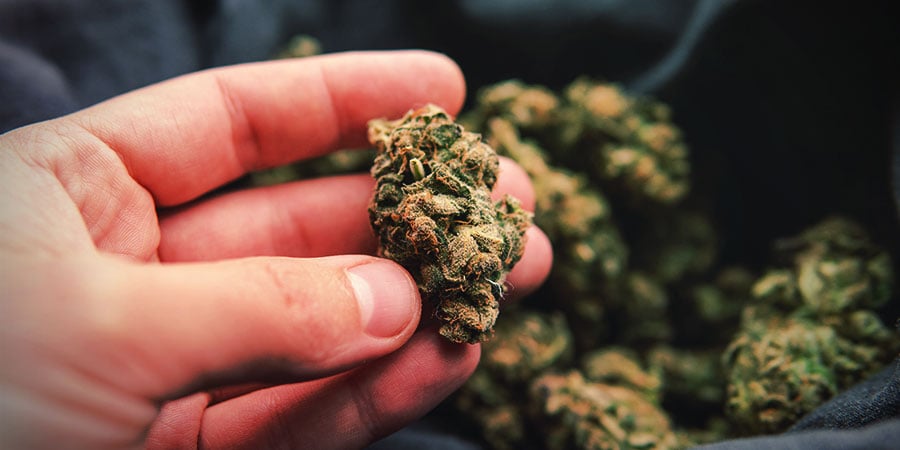
Bud density is essential for several reasons. First and foremost, the denser the buds, the better the yield! Imagine two plants that are the same size and have produced the same amount of flowers. The plant on your left has produced full, nugget-shaped flowers that are ripe for the picking. The plant on the right has produced the same quantity of buds, but they are airy, flimsy, and in a generally sorry state. In fact, they’re half as dense as the flowers produced by the plant on your left.
Both plants have produced an identical quantity of buds, but the yield from the plant on the left is twice as large. The density of each bud means there’s double the amount of tissue, which means growers will enjoy twice as many joints and bong bowls.
Although this is an extreme example, it’s a good way to understand the importance of achieving the densest buds possible.
Flower density is also an essential factor for commercial growers as well as dispensary and coffeeshop owners. When properly manicured, dense buds look dramatically more visually appealing than airy flowers.
There are many variables involved in the cultivation of prime, thick cannabis flowers. Genetic factors play a significant role, but environmental factors determine the ultimate fate of buds. Optimal lighting, nutrition, and training almost always result in the production of dense flowers. On the contrary, a lack of any of these vital components will give rise to airy, lacklustre blossoms.
Before we get into how to grow dense flowers, let’s take a quick look at what to avoid.
WHAT HAPPENS IF YOU ABUSE CANNABIS BUDS?
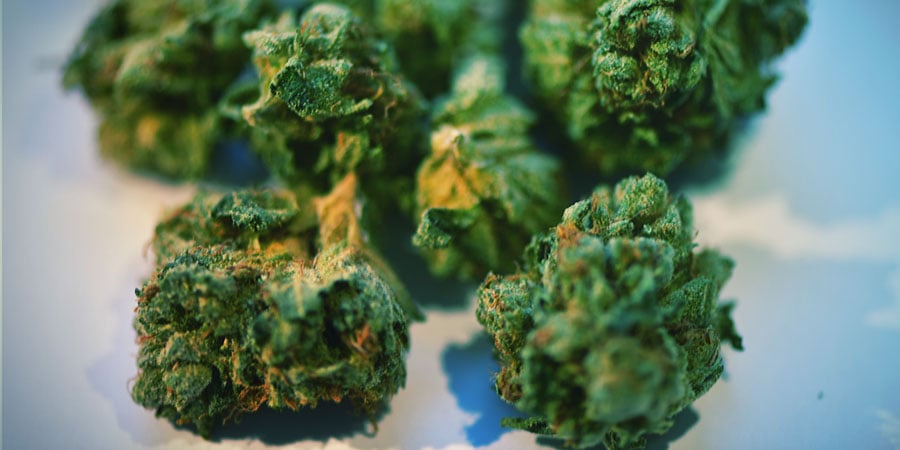
The abuse of cannabis flowers (which is mostly mere accidental neglect) results in so-called B-grade weed. This is the kind of flower that sellers wouldn’t take a second look at. It’s the quality of flower that’s best left to cure for a long time, only to be smoked when your high-grade has run dry.
If plants miss out on any of the key factors mentioned above, flowering won’t be as proliferative. A light deficit will minimise photosynthesis and disrupts energy production and microbial synergy in the root zone. A deficiency in a single nutrient is enough to bring about dire symptoms, mess with a plant’s physiology, and rob flowers of their potential density.
It’s not hard to spot a B-grade flower. They often take on the appearance of popcorn, hence the name popcorn buds. These blossoms lack size and display a fluffy and loose appearance.
6 STEPS TO DENSE CANNABIS BUDS
Popcorn buds are a disappointing sight, especially after careful germination, weeks of vegetation, and a long flowering phase, not to mention all the time spent attending to your babies. Below, you’ll learn how to avoid this outcome and raise dense, admirable colas instead.
1. IT ALL STARTS WITH GENETICS
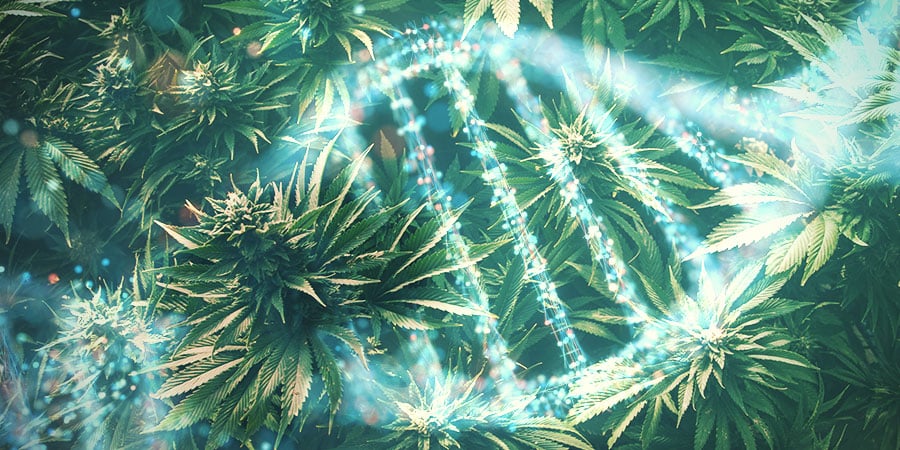
Genetics is a crucial factor when it comes to growing dense buds. There are hundreds of well-known cannabis cultivars, and all of them feature slightly different characteristics. Some exert a stoning effect, whereas others are energising. Some grow to towering heights; others stay bushy and low to the ground. Bud density is also a trait that varies from strain to strain.
Some cultivars are genetically wired to produce airy, fluffy buds. It doesn’t necessarily mean they’re less potent, but it does impact their aesthetic glory. Sativa varieties tend to produce buds that are on the airier side of the spectrum. In contrast, indica varieties mostly produce thick, compact colas.
If you decide to begin the quest for the densest flowers, it’s best to start with a pure indica specimen or a heavily indica-dominant hybrid. There’s a vast catalogue of indica genetics that varies massively in taste, effect, and flowering time.
2. KEEP TEMPERATURE UNDER CONTROL
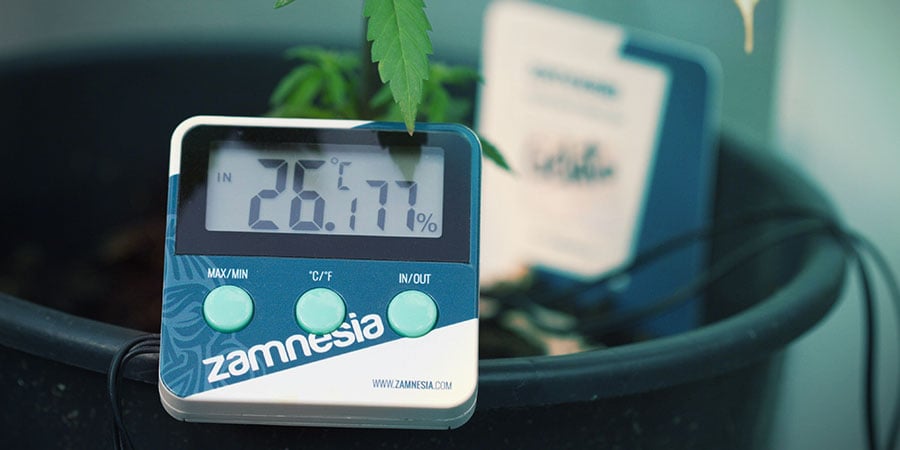
Temperature has a massive influence on the shape and size of cannabis colas. The plant thrives within the relatively broad temperature range of 18–26°C, and can even survive temps as high as 30°C. However, if temperatures leave the ideal range—due to cold snaps or heat waves—buds will start to go haywire and become airy.
Growers need to ensure that temperatures remain warm enough during the night and cool enough in the day. Indoor growers have the advantage here, as climate control is easier in grow rooms. One can keep things under control using air conditioning, fans, heaters, and a hygrometer. This can even be automated using sensors and timers.
Outdoor growers have less control, and are at the mercy of the elements. To avoid excess heat, they can erect shade cloth around their plants and instal fans in polytunnels.
3. LIGHT INTENSITY AND SPECTRUM ARE CRUCIAL
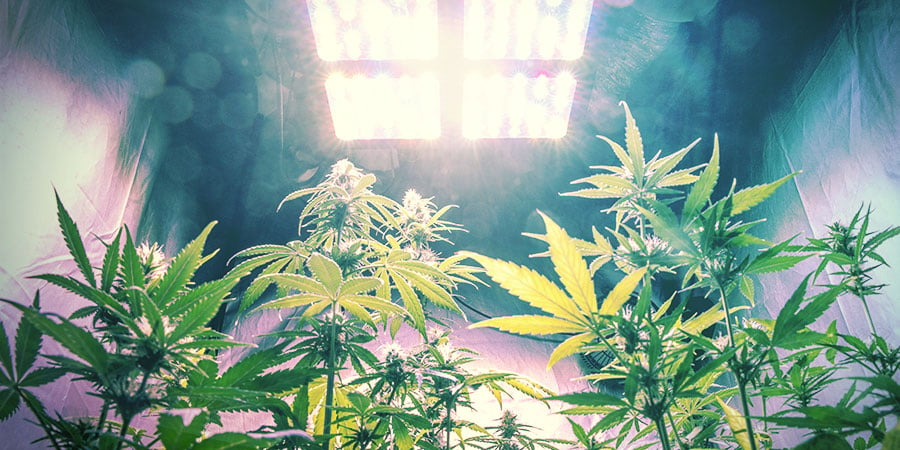
Light is perhaps the most important factor in achieving dense buds. It’s needed by plants to conduct photosynthesis, create vital sugars, and grow. However, not any old lights will do. Plants need optimal intensity and the right spectrum of light to put out plump, resinous flowers.
Plants grown outdoors will perform best under direct sunlight for most of the day. 10–12 hours is optimal. Growers should also aim to plant them on south-facing slopes to maximise exposure. Plants should also be evenly spaced, with enough room between them so they don’t block each other's light.
Indoor growers have a choice between various types of lights. However, LEDs are among the best. They are cheap to run, powerful, and put off little heat—with one minor drawback if you opt for high-quality panels: the acquisition cost.
Growers should aim for a light intensity of 1000W per square metre. This strength will be sufficient in optimising steady plant growth and producing dense flowers. Cultivators must be mindful where they position their lights. Placing them too far away will reduce the rate of photosynthesis. However, placing them too close can result in heat stress and reduce bud density.
If you’re using LEDs, position them 60cm above your plants. Move the light source slightly closer day by day. If you begin to see signs of bleaching, raise the lights 5cm at a time until symptoms subside.
4. TRIM, TRAIN, AND PRUNE
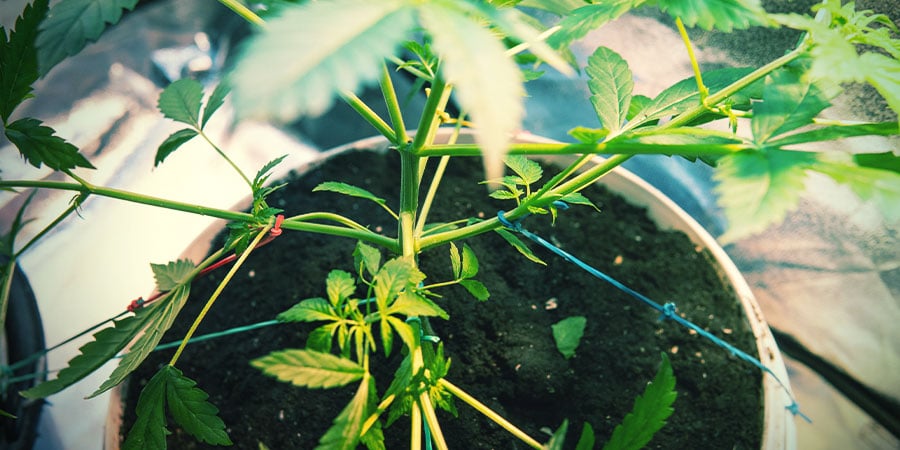
If left to their own devices, cannabis plants grow vertically and produce one main central cola. This growth pattern isn’t ideal if you’re looking to maximise yield and flower density. Thankfully, several techniques can be used to re-shape plants and enhance their output.
Training techniques such as low-stress training (LST) are used to open up the canopy and produce an abundance of main colas. During LST, growers use garden wire to tie down the main stem to the side of the container. The side branches then begin to grow vertically, and effectively become stems themselves. Done repetitively, this vastly improves yield, light exposure, and flower quality. High-stress techniques like topping can also be used to encourage ramification and improve bud density.
Pruning can similarly be used to enhance growth, flower quality, and shape. By removing selected leaves and branches, growers direct energy and resources toward the flowers instead.
5. DON’T RUSH HARVEST
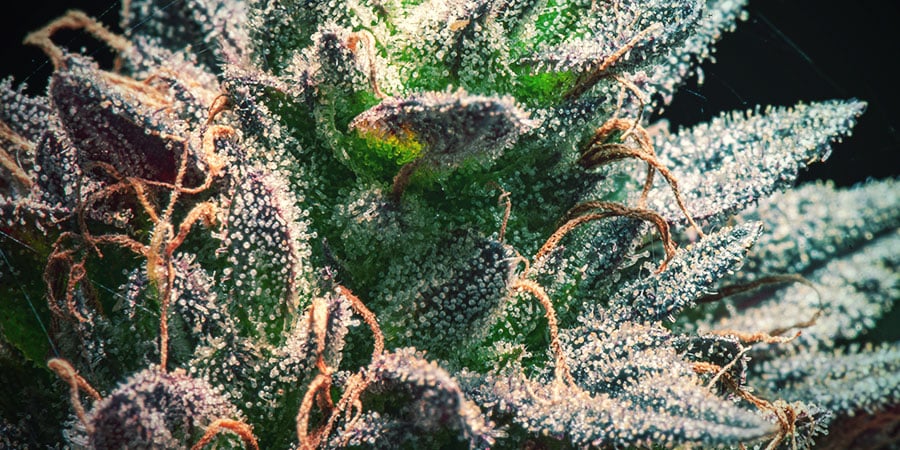
We get it, harvest time is exciting! You’ve spent months watching your plants develop from vulnerable seedlings into blossoming beauties. Beginner growers tend to want to pull their buds off the plant as soon as possible. Although this is tempting, waiting for the right time is key. Buds develop rapidly during the flowering stage, and even waiting a couple more days can improve density. There are a few factors to look out for to know when the time is right. It helps to use a magnifying glass or jeweller's loupe to see them.
One harvest indicator is trichome colour. These are the crystalline structures that occupy the surface of flowers and sugar leaves. During the early flowering phase, trichomes appear translucent. Eventually, they’ll become more cloudy. When the majority of trichomes are cloudy, it’s time to harvest.
Growers should also keep an eye on pistils, the hairlike structures found all over cannabis flowers. Young pistils are white, but become orange-red or brown when mature.
6. CAREFULLY CONTROL NUTRIENTS
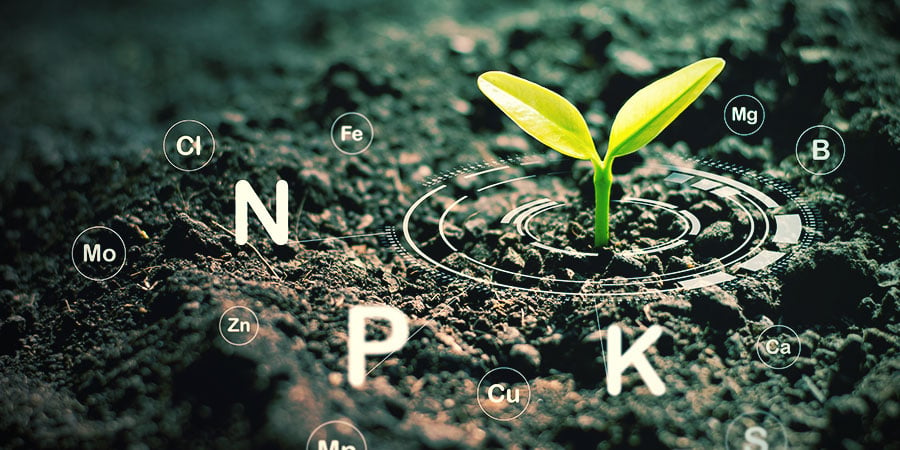
Cannabis requires a broad array of nutrients to grow properly, including the macronutrients nitrogen, phosphorus, and potassium, and micronutrients such as zinc and manganese. If plants don’t get enough nutrients, or can’t access them, they’ll begin to exhibit deficiency symptoms, and flower quality will be affected. However, too many nutrients can also harm plants and reduce bud density.
Growers should carefully administer nutrients according to product recommendations. Even here, you should err on the side of caution by administering 50% of the recommended amount during early veg. Soil pH needs to be slightly acidic to avoid deficiencies. Introducing beneficial microorganisms to the soil, such as mycorrhizal fungi, will also help plants access the nutrients they need.
Those serious about giving their plants some much-needed nutrients, should certainly try Monster Bud Boost Pack in combination with Monster Bud Mix. This harmonious blend of nutrients will undoubtedly give the plants a helping hand, with compact and dense buds as your reward. It's the perfect solution for those who want to approach nutrition in an easy and balanced way.
-
 5 min
May 5, 2025
Simple tips to grow better weed
Think growing great weed is hard? With a few essential weed-growing tips and some basic know-how, anyone can enjoy top-shelf harvests in any setup. Get acquainted with eight essential tips for...
5 min
May 5, 2025
Simple tips to grow better weed
Think growing great weed is hard? With a few essential weed-growing tips and some basic know-how, anyone can enjoy top-shelf harvests in any setup. Get acquainted with eight essential tips for...
-
 5 min
February 1, 2022
How To Boost Trichome Production In Cannabis
Ready to take your cannabis plants to the next level? Keep reading to find out how to take action throughout a weed plant's life cycle to maximise trichome production, leading to greater levels of...
5 min
February 1, 2022
How To Boost Trichome Production In Cannabis
Ready to take your cannabis plants to the next level? Keep reading to find out how to take action throughout a weed plant's life cycle to maximise trichome production, leading to greater levels of...
-
 4 min
April 10, 2018
6 Ways To Increase Cannabis Yields
Increasing cannabis yields is of paramount importantance to all growers. With our 6 simple methods even tiny gardens of just one or two cannabis plants can produce a heavy harvest.
4 min
April 10, 2018
6 Ways To Increase Cannabis Yields
Increasing cannabis yields is of paramount importantance to all growers. With our 6 simple methods even tiny gardens of just one or two cannabis plants can produce a heavy harvest.
-
 4 min
October 16, 2017
How To Grow Huge Ass Buds: 10 Steps To Success
Cannabis cultivators of all levels have one thing in common. We are all looking for a fat stash of our favourite marijuana. If you want to grow enormous cannabis colas, you need to take 5 minutes...
4 min
October 16, 2017
How To Grow Huge Ass Buds: 10 Steps To Success
Cannabis cultivators of all levels have one thing in common. We are all looking for a fat stash of our favourite marijuana. If you want to grow enormous cannabis colas, you need to take 5 minutes...




 United States
United States










